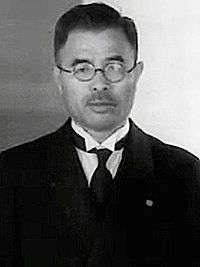Kazuo Aoki
Kazuo Aoki (青木 一男, Aoki Kazuo, November 28, 1889 – June 25, 1982), was a bureaucrat and cabinet minister in the Empire of Japan, serving as Minister of Finance, and Minister of Greater East Asia.
Kazuo Aoki 青木 一男 | |
|---|---|
 Kazuo Aoki in the 1940s | |
| Minister of Greater East Asia | |
| In office 1 November 1942 – 22 July 1944 | |
| Prime Minister | Hideki Tojo |
| Preceded by | Position established |
| Succeeded by | Mamoru Shigemitsu |
| Minister of Finance | |
| In office 30 July 1939 – 16 January 1940 | |
| Prime Minister | Nobuyuki Abe |
| Preceded by | Sotaro Ishiwata |
| Succeeded by | Yukio Sakurauchi |
| Personal details | |
| Born | November 28, 1889 Sarashina District, Nagano, Japan |
| Died | June 25, 1982 (aged 92) |
| Alma mater | Tokyo Imperial University |
Biography
Aoki was born to a farming family in Sarashina District, Nagano prefecture (now part of the city of Nagano), and was trained as a lawyer, graduating from the Law School of Tokyo Imperial University in 1916. On graduation, he entered the Ministry of Finance. Rising rapidly through the ranks, Aoki became chief of the Financial Bureau under Takahashi Korekiyo, who made use of his legal background to have Aoki draft a Foreign Exchange Management Act, which was passed by the Diet of Japan in 1933. Up until that time, Japan had not attempted to implement comprehensive state control over foreign exchange. Aoki followed up on this law with the Rice Control Act (1933) and the Petroleum Control Act (1934), which set the stage for increasing state control over strategic sectors of the economy. He was also on the committee which drafted the National Service Draft Ordinance, which placed the Japanese economy on a war economy footing after the start of the Second Sino-Japanese War. Prime Minister Fumimaro Konoe asked Aoki to become deputy director of the Cabinet Planning Board in 1937, and he became its chairman in 1939. The same year, Aoki was nominated to a seat in the Upper House in the Diet.
Under Prime Minister Abe, Aoki was Minister of Finance in 1939, while retaining his post as chairman of the Cabinet Planning Board. After the fall of the Abe administration, Aoki was assigned as a special envoy to the Reorganized National Government of China to guide economic policy. He was recalled to Japan under the Tōjō administration to the newly created cabinet post of Minister of Greater East Asia In November 1942, in which position he oversaw the Greater East Asia Conference.
Aoki visited Japanese-occupied Batavia in May 1943, meeting with Mohammad Hatta, who as representative for the Indonesian nationalists, advised him that unless there was a shift in Japanese policy towards granting independence for Indonesia (as it had for Burma and the Philippines), it would be increasingly difficult to maintain popular support for Japan. Aoki promised to raise the issue with Tōjō, who mentioned his intent to grant independence to Malaya, Sumatra, Java, Borneo and Sulawesi within a year in his June 1943 parliamentary speech.[1]
After the surrender of Japan, Aoki was arrested (as were all former government members) by the Supreme Commander of the Allied Powers and held in Sugamo Prison on charges of war crimes. However, he was released in 1948 without coming to trial. Afterwards, Aoki established a private legal practice. In 1953, he ran for a seat in the House of Councilors with the support of the Liberal Party on a nationwide ticket. He was subsequently reelected to the same seat three more times as a member of the Liberal Democratic Party (LDP). He joined a right-wing faction within the LDP in 1960 which was adamantly opposed to Japan’s normalization of relations with the People’s Republic of China and supported Japan’s continued recognition of the Republic of China on Taiwan. He was also a strong supporter of building a nationwide network of highways in Japan, especially the Chūō Expressway.
After his retirement from politics, Aoki joined the Board of Directors of Shin-etsu Broadcasting, and in 1968 was one of the founders of the Nagano Broadcasting Systems. In 1971, he was awarded the Order of the Rising Sun, 1st class. He published his memoirs in 1981, shortly before his death in 1982.
References
- Post, Peter (2010). The Encyclopedia of Indonesia in the Pacific War. Brill. ISBN 978-90-04-16866 4.
External links
| House of Councillors | ||
|---|---|---|
| Preceded by Tadayasu Iwasawa |
Chair of Budget Committee of House of Councillors of Japan 1953–1954 |
Succeeded by Eizō Kobayashi |
| Preceded by Kichinosuke Saigō |
Chair of Finance Committee of House of Councillors of Japan 1955 |
Succeeded by Shinichi Okazaki |
| Preceded by Masae Koyanagi |
Chair of Cabinet Affairs Committee of House of Councillors of Japan 1956 |
Succeeded by Tokuji Kameda |
| Political offices | ||
| Preceded by Sōtarō Ishiwata |
Minister of Finance 1939–1940 |
Succeeded by Yukio Sakurauchi |
| New title | Minister of Greater East Asia 1942–1944 |
Succeeded by Mamoru Shigemitsu |
| Party political offices | ||
| Preceded by Kamejirō Hayashiya |
Chair, Liberal Democratic Party House of Councillors' Committee 1965–1966 |
Succeeded by Tarō Hirai |
| Honorary titles | ||
| Preceded by Yoshio Kijima |
Oldest member of the House of Councillors of Japan 1974–1977 |
Succeeded by Fusae Ichikawa |